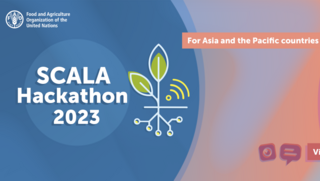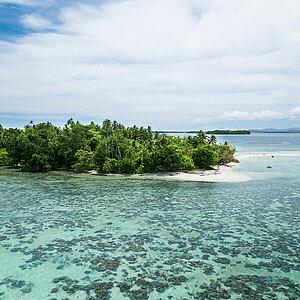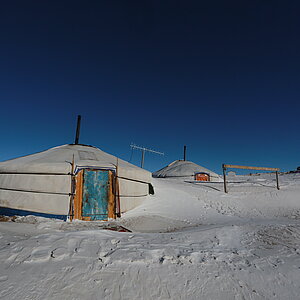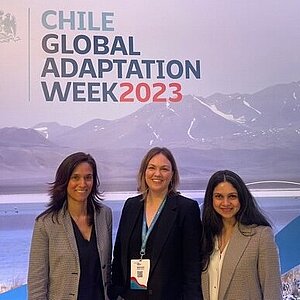Team from Mongolia wins climate action hackathon

The competition was looking for climate action ideas for Cambodia, Mongolia, Nepal and Thailand.
In recent years, hackathons have emerged as a powerful space for engaging youth in the fight against climate change. These intensive, yet collaborative events bring together teams of young innovators and entrepreneurs to develop innovative solutions to some of the world's most pressing environmental challenges. Hackathons provide unique opportunities for young people to have their voices and ideas heard, and to take an active role in shaping the future of our planet.
The IKI supported SCALA programme aims to foster a culture of innovation and experimentation by engaging youth to help catalyse the development of solutions to some of the most urgent environmental problems. In February 2023, the programme hosted an online hackathon for the Asia and Pacific region to find and grow ideas that can help tackle the impacts of climate change in the SCALA partner countries in the region: Cambodia, Mongolia, Nepal and Thailand. The event showcased innovation and creativity, with each participating team bringing their unique solutions to the table.
The hackathon journey
The SCALA hackathon was a popular event with interest from 76 applicants from 16 countries demonstrating the eagerness of youth in the region to take climate action. From this pool of applicants, the top 16 teams from 11 countries were invited to attend a full-day “hackathon boot camp”, a capacity-building workshop designed to provide participating teams with the necessary tools and skills to develop their ideas and prepare a winning pitch.
The boot camp included sessions on design thinking, problem-solving, storytelling and pitching skills. The teams were able to learn from experienced facilitators and speakers and network with other participants. It was an opportunity for teams to connect with each other and to provide them with the knowledge and confidence to take their ideas to the next level at the hackathon pitching day a week later.
On the SCALA hackathon pitching day, eight teams entered to present their final pitches to a panel of three judges. The judges heard a range of ideas and solutions from how bees and mushroom farming can combat air pollination in Thailand, to a web-GIS tool that determines the area for reducing water and fertilizer usage in rice farming. Following the first round, the top five teams were chosen as finalists to move on to the final round of pitching.
And the winner ist ...

After the second and final round of pitches, the judges selected one winner among the finalists: Team Splicing from Mongolia.
The winning idea was a mobile phone application for data collection of livestock for better herd and livestock planning and monitoring. Since livestock is a major source of greenhouse gas (GHG) emissions in Mongolia, this app could be useful in managing livestock and subsequently reducing GHG emissions. Many of Mongolia’s rural communities are traditionally nomadic pastoralists. The livestock and agriculture sector are very important to Mongolia’s economy and contributed to 12.8 percent of the national GDP in 2020 and 2021.
Indeed, in 2022, Mongolia reached a record high number of livestock with 71 million animals (National Statistical Office, 2022). The country has taken measures to reduce this number, including the adoption of a new law that imposed a “livestock tax” on herders. This policy was introduced to address several issues like pasture overexploitation, balance of herd structure and reduction of livestock numbers, to ultimately try to reduce GHG emissions. The proposed mobile application will support the implementation of the livestock sector policy and more substantial market engagement of herders.
Team Splicing’s idea offered a real-life solution to the on-going challenges Mongolia faces in reducing and tracking its GHG emissions from the livestock sector, a commitment outlined in its Nationally Determined Contribution (NDC). The innovative mobile application for Mongolia can be applied and piloted within the country’s context and help connect herders’ data with the government’s Action Plan for the NDC.
The other top innovative ideas
The hackathon judges also saw great potential in the other four finalist teams from Cambodia, Indonesia, Mongolia and Nepal. Team Kaksesor from Cambodia was the youngest team to enter the hackathon and pitched their project “Robang” that covers rubber collecting bowls on trees with nylon to protect it from torrential rain and proposed a system of raindrop sensors that can collect weather data for better forecasting and ultimately prevent wastage of raw rubber.
Team Meaning Maker from Indonesia pitched a self-serving analytics platform to formulate strategies to better handle climate change issues in Nepal. Team Speck Materials from Mongolia proposed using animal manure to produce paper using eco-friendly methods, as there is no domestic market for manure in Mongolia and a USD 62.5 million pulp and paper market.
Team LeadING from Nepal pitched solution using AI data, internet and data visualization to minimize the issue of food loss and GHG emissions, with a focus on potato farming. The FAO and UNDP SCALA team is discussing future ideas to create and exchange innovative solutions to climate change with youth in other regions, while supporting local communities.
You can read the full version of the article on the UNDP SCALA and FAO SCALA websites.
The link has been copied to the clipboard
Contact
IKI Office
Zukunft – Umwelt – Gesellschaft (ZUG) gGmbH
Stresemannstraße 69-71
10963 Berlin


















